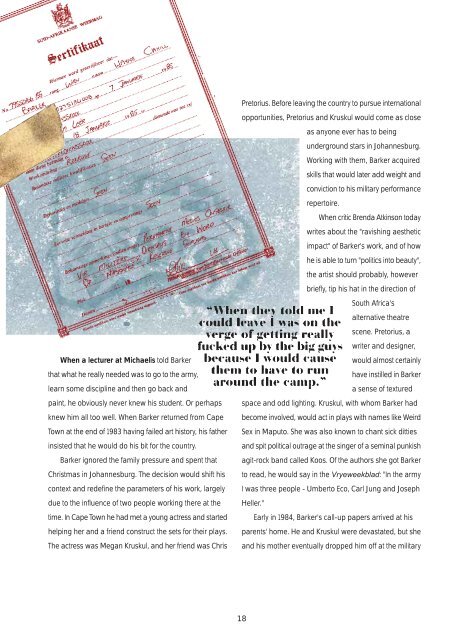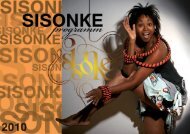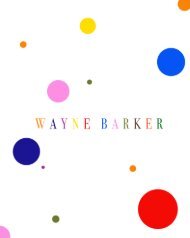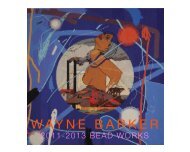WAYNE BARKER, ARTIST’S MONOGRAPH
Published 2000 in association with Chalkham Hill Press
Published 2000 in association with Chalkham Hill Press
Create successful ePaper yourself
Turn your PDF publications into a flip-book with our unique Google optimized e-Paper software.
When a lecturer at Michaelis told Barker<br />
that what he really needed was to go to the army,<br />
learn some discipline and then go back and<br />
paint, he obviously never knew his student. Or perhaps<br />
knew him all too well. When Barker returned from Cape<br />
Town at the end of 1983 having failed art history, his father<br />
insisted that he would do his bit for the country.<br />
Barker ignored the family pressure and spent that<br />
Christmas in Johannesburg. The decision would shift his<br />
context and redefine the parameters of his work, largely<br />
due to the influence of two people working there at the<br />
time. In Cape Town he had met a young actress and started<br />
helping her and a friend construct the sets for their plays.<br />
The actress was Megan Kruskul, and her friend was Chris<br />
Pretorius. Before leaving the country to pursue international<br />
opportunities, Pretorius and Kruskul would come as close<br />
as anyone ever has to being<br />
underground stars in Johannesburg.<br />
Working with them, Barker acquired<br />
skills that would later add weight and<br />
conviction to his military performance<br />
repertoire.<br />
When critic Brenda Atkinson today<br />
writes about the "ravishing aesthetic<br />
impact" of Barker's work, and of how<br />
he is able to turn "politics into beauty",<br />
the artist should probably, however<br />
briefly, tip his hat in the direction of<br />
South Africa's<br />
alternative theatre<br />
scene. Pretorius, a<br />
writer and designer,<br />
would almost certainly<br />
have instilled in Barker<br />
a sense of textured<br />
space and odd lighting. Kruskul, with whom Barker had<br />
become involved, would act in plays with names like Weird<br />
Sex in Maputo. She was also known to chant sick ditties<br />
and spit political outrage at the singer of a seminal punkish<br />
agit-rock band called Koos. Of the authors she got Barker<br />
to read, he would say in the Vryeweekblad: "In the army<br />
I was three people - Umberto Eco, Carl Jung and Joseph<br />
Heller."<br />
Early in 1984, Barker's call-up papers arrived at his<br />
parents' home. He and Kruskul were devastated, but she<br />
and his mother eventually dropped him off at the military<br />
18








